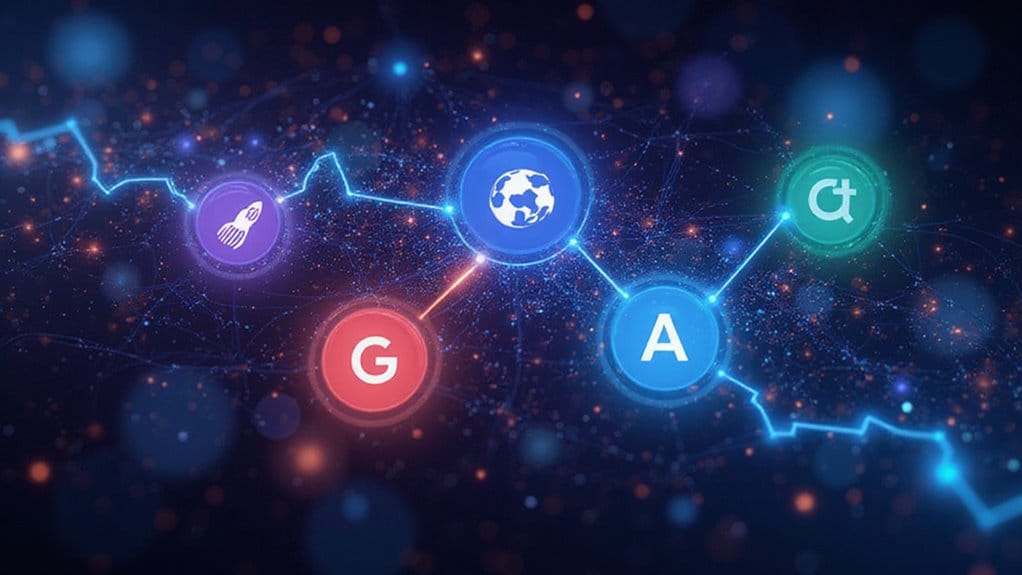Web AI, fueled by machine learning, is transforming the internet like a caffeine-fueled coder on a mission! It smartens up user interactions, making online experiences more personalized—great, right? But hold up! Privacy issues lurk around every corner. Your data? It’s like letting strangers snoop in your diary. And let’s not forget the bias in those oh-so-smart algorithms; they can unfairly skew results in big ways. Stick around to discover how you can navigate this wild, digital landscape safely!

In a world where technology evolves faster than a cat meme goes viral, understanding Web AI and machine learning isn’t just a luxury—it’s an essential requirement. Every click you make online is influenced by intelligent systems designed to enhance your experience, but there’s a catch. These systems, while amazing, rely heavily on data, and that opens a Pandora’s box of concerns.
Let’s talk about data privacy. When AI collects and analyzes your information, it’s like inviting a stranger to rummage through your closet—awkward, right? Furthermore, AI algorithms designed for various applications make decisions using real-time data, which heightens the importance of transparency in how your information is utilized. The collection of this data often occurs without transparent consent, making users vulnerable to exploitation.
Inviting AI to analyze your data is like letting a stranger explore your personal space—uncomfortably intrusive.
Algorithm bias is another elephant in the room. If the data fed into these systems is skewed, guess what? The results are too. This could lead to unfair outcomes in everything from job applications to loan approvals.
Now, onto ethical considerations. As machine learning trends continue to shape our digital landscape, we must ask ourselves: Are we comfortable with AI making decisions for us? Lack of AI regulations means we’re sailing in uncharted waters. We need frameworks to guarantee these technologies are used responsibly. So, before you engage with that AI-powered chatbot, consider the implications.
Personalization techniques enhance user engagement, providing tailored content that feels almost psychic. But, is it authentic? AI can generate content like blog posts and product descriptions, but if that’s all we encounter, how do we discern what’s real? It’s vital to maintain content authenticity in a sea of machine-generated noise. Additionally, machine learning models enable computers to learn from data patterns, allowing for increasingly sophisticated personalization techniques.
So, how can you navigate this complex landscape? Stay informed. Demand transparency from companies about how they use your data. Advocate for ethical standards in AI development.
With great power comes great responsibility—especially when it involves algorithms that might just decide your future.
In short, embrace the wonders of AI and machine learning, but do so with your eyes wide open. The digital world is changing, and it’s up to you to make certain it changes for the better.
Frequently Asked Questions
How Can Small Businesses Leverage Web AI for Growth?
Small businesses can harness web AI to amplify growth by diving into customer insights, which reveal what their customers really want—no more guessing games!
Implement targeted marketing strategies using AI tools to reach ideal customers. Start by analyzing data; see what works and what flops.
Don’t wait—get AI-driven chatbots for 24/7 support and personalized recommendations. Trust us, this isn’t just smart; it’s essential for staying competitive in today’s market.
What Are the Ethical Concerns Surrounding Machine Learning in the Web?
Ethical concerns in machine learning are serious business!
First, tackle bias mitigation—ensure data isn’t skewed.
Next, prioritize data privacy; nobody likes their secrets exposed.
Demand algorithm transparency—if it’s a black box, run away!
Accountability measures are vital; who’s responsible when things go wrong?
So, remember: address biases, protect privacy, push for clear algorithms, and hold systems accountable.
It’s not just smart; it’s essential for a fair digital world.
Don’t be complacent!
How Does Web AI Impact Job Opportunities in Tech?
Web AI is shaking up tech job opportunities, that’s for sure!
Sure, AI job displacement is real—some roles will vanish faster than your lunch break. But don’t panic! Embrace reskilling the workforce. Immerse yourself in machine learning courses, polish your coding, or learn about AI ethics.
Automating tasks might sound scary, but it creates new roles too! Adapt, learn, and thrive; don’t be left behind while others ride the AI wave!
Can Web AI Improve Online Security and Privacy?
Web AI can greatly boost online security and privacy.
Imagine data encryption working tirelessly to keep your information safe from prying eyes. Pair that with robust user authentication—think of it as a bouncer for your online accounts—and you’ve got a solid defense.
Don’t wait for a breach to happen; implement these technologies now! Protect yourself.
What Industries Benefit Most From Machine Learning Technologies?
Industries like healthcare, finance, and retail are riding the machine learning wave—so why aren’t you?
In healthcare analytics, it’s about predicting patient outcomes. Financial forecasting? Say goodbye to guesswork! Retail optimization helps you find that sweet spot for prices.
Marketing automation personalizes your strategy, while supply chain management streamlines logistics.
And don’t forget agriculture technology and education tools; they’re transforming farming and learning. Immerse yourself, or risk falling behind!









